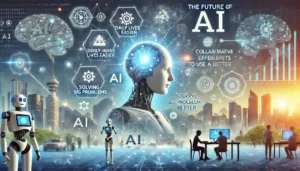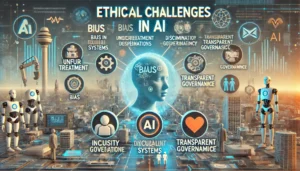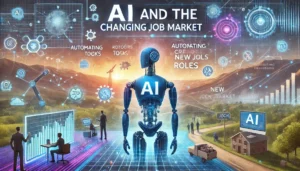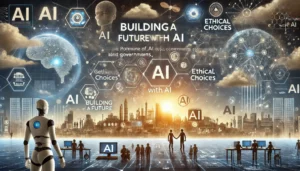Demystifying the Future of AI: Exploring Its Power, Challenges, and Collaborative Potential

The Future of AI: Artificial intelligence (AI) is changing the world in many ways, from making our daily lives easier to solving big problems. This article explores how AI is powerful, the challenges it brings, and how working together can help us use it better.
Key Takeaways
- AI is transforming industries, everyday life, and driving economic growth.
- Ethical concerns like bias, privacy, and regulation need to be addressed.
- Collaboration between governments, companies, and schools is crucial for AI development.
- AI can help solve global issues in healthcare, the environment, and public safety.
- The future of work will change with AI, creating new jobs and requiring new skills.
The Transformative Power of AI
Revolutionising Industries
AI is changing the way industries operate. From manufacturing to healthcare, AI-driven technologies are making processes faster and more efficient. Robots and automation are taking over repetitive tasks, allowing humans to focus on more complex problems. In healthcare, AI helps in diagnosing diseases early, leading to better patient outcomes.
Enhancing Everyday Life
AI is not just for big industries; it’s also making everyday life easier. Virtual assistants like Siri and Alexa help you manage your day, while recommendation algorithms suggest movies and products you might like. AI is even making your home smarter with devices that learn your habits and adjust settings automatically.
Driving Economic Growth
The Future of AI: AI is a major driver of economic growth. By improving efficiency and creating new products and services, AI contributes to the economy in significant ways. Companies that adopt AI technologies often see increased productivity and reduced costs. This, in turn, can lead to job creation in new sectors, even as some traditional jobs may be automated.
Navigating the Ethical Landscape of AI
Addressing Bias and Fairness
AI is reshaping our world, but with its rise come notable ethical challenges. One of the most pressing issues is bias in AI systems. These biases can lead to unfair treatment and discrimination. To craft an unbiased and inclusive AI that aligns with society’s interests, we must prioritise inclusivity and ensure transparent governance. Addressing these challenges demands a united effort from all AI stakeholders. This includes governments, corporations, and civil society working together to uphold and embed ethical principles in AI’s evolution.
Ensuring Privacy and Security
With the increasing use of AI, privacy and security concerns have become paramount. AI systems often require vast amounts of data, which can lead to potential misuse and breaches of privacy. Balancing data use with privacy is crucial. Implementing robust security measures and ethical guidelines can help mitigate these risks. It’s essential to continuously monitor and adapt AI systems to ensure they protect individual privacy and maintain security.
Balancing Innovation with Regulation
Innovation in AI is rapid, but it must be balanced with appropriate regulation. Developing and implementing regulatory frameworks that protect individuals and society from potential harms is essential. These frameworks should emphasise principles such as transparency, accountability, fairness, and privacy. By doing so, we can foster an AI ecosystem that prioritises human dignity and societal welfare while still encouraging innovation.
Collaborative Efforts in AI Development
Government Initiatives
Governments play a crucial role in the advancement of AI. By funding research and setting up regulatory frameworks, they ensure that AI technologies are developed responsibly. Public-private partnerships are essential for driving innovation and ensuring that AI benefits society as a whole. Governments can also promote AI literacy and provide resources for education and training.
Corporate Responsibility
Corporations, especially those in the tech industry, have a significant responsibility in AI development. Companies must prioritise ethical considerations and transparency in their AI projects. By investing in PPC management and collaborating with a PPC ad agency, businesses can effectively market their AI solutions while maintaining ethical standards. Additionally, corporations should engage in open dialogue with stakeholders to address concerns and share best practices.
Academic Contributions
Academic institutions are at the forefront of AI research. Universities and research centres contribute by exploring new algorithms, developing innovative applications, and addressing ethical issues. Collaboration between academia and industry can lead to ground-breaking advancements. Furthermore, academic programs should focus on interdisciplinary studies, combining AI with fields like ethics, social sciences, and law to create well-rounded professionals.
Collaborative efforts between governments, corporations, and academia are essential for the responsible development of AI. By working together, we can harness the power of AI to create a better future for all.
AI’s Role in Tackling Global Challenges
Healthcare Advancements
AI is revolutionising healthcare by enabling early disease detection, personalised treatment plans, and efficient management of medical records. AI algorithms can analyse vast amounts of medical data to identify patterns that might be missed by human doctors. This leads to quicker diagnoses and more effective treatments. Additionally, AI-powered robots assist in surgeries, ensuring precision and reducing recovery times.
Environmental Sustainability
AI applications are crucial in the fight against climate change. From optimising energy consumption in smart grids to monitoring deforestation and wildlife populations, AI helps protect our planet. For example, AI can predict weather patterns and natural disasters, allowing for better preparedness and response. Precision agriculture uses AI to enhance crop yields and reduce waste, contributing to sustainable farming practices.
Public Safety and Security
AI enhances public safety by improving surveillance systems, predicting crime hotspots, and aiding in disaster response. Advanced AI systems can analyse video footage in real-time to detect suspicious activities and alert authorities. In disaster management, AI models predict the impact of natural calamities, helping in efficient resource allocation and timely evacuations.
The integration of AI in these areas showcases its potential to address some of the most pressing global challenges. By leveraging AI, we can create a safer, healthier, and more sustainable world.
The Future of Work in an AI-Driven World
Job Displacement and Creation
AI is changing the job market by automating some tasks and creating new roles. While some jobs may disappear, others will emerge, especially in tech fields like programming and data analysis. It’s crucial to adapt to these changes by learning new skills and staying flexible.
Skills for the Future
In an AI-driven world, both technical and soft skills are important. Technical skills include things like coding and data science, while soft skills involve critical thinking and adaptability. Lifelong learning and interdisciplinary teamwork will help you stay relevant.
Redefining Human-AI Collaboration
Working with AI means humans and machines will need to collaborate more closely. This partnership can lead to greater productivity and innovation. Understanding how to interact with AI will be a key skill in the future workplace.
The future of work will require a balance between embracing new technologies and supporting workers through education and training.
Fostering Inclusivity in AI
Bridging the Digital Divide
AI is reshaping our world, but with its rise come notable ethical challenges. To craft an unbiased and inclusive AI that aligns with society’s interests, we must prioritise inclusivity, ensure transparent governance, balance data use with privacy, reskill the workforce, and set robust ethical guidelines. Tackling these challenges demands a united effort from all AI stakeholders to uphold and embed ethical principles in AI’s evolution.
Promoting Diversity in AI Development
- Interdisciplinary Collaboration: Encouraging collaboration between AI researchers, ethicists, social scientists, and other stakeholders to address ethical issues.
- Inclusive Design: Involving diverse perspectives in the design and development of AI systems to ensure that they meet the needs of all users.
- Ethical Education and Training: Providing education and training on ethical AI principles and practices for developers, researchers, and policymakers.
Ensuring Accessibility for All
AI systems are only as unbiased as the data they are fed, and historical data can often reflect existing prejudices. This section will discuss the importance of addressing bias in AI to prevent the perpetuation of inequality and discrimination. We’ll delve into strategies for creating fairer AI systems, including diverse dataset curation, algorithmic transparency, and the development of fairness metrics.
Innovative AI Applications for Social Good
Education and Learning
AI is transforming education by personalising learning experiences and providing real-time feedback. Adaptive learning platforms can tailor educational content to meet individual student needs, making learning more engaging and effective. For instance, AI-driven tools can identify areas where students struggle and offer additional resources to help them improve. This not only enhances the learning experience but also ensures that no student is left behind.
Community and Social Services
In the realm of community and social services, AI is being used to improve the efficiency and effectiveness of various programs. AI-powered chatbots, for example, can provide instant support and information to individuals seeking assistance, reducing the burden on human service providers. Additionally, AI can analyse data to identify trends and patterns, helping organisations to better allocate resources and address community needs more effectively.
Humanitarian Efforts
AI is playing a crucial role in humanitarian efforts by providing tools that can predict and respond to crises more effectively. For example, AI algorithms can analyse satellite imagery to detect natural disasters and assess damage, enabling quicker and more targeted responses. Furthermore, AI can help in the distribution of aid by optimising supply chains and ensuring that resources reach those in need promptly.
By leveraging AI for social good, we can address some of the most pressing challenges facing our world today. From enhancing education to improving community services and responding to humanitarian crises, AI has the potential to make a significant positive impact on society.
In the context of digital marketing, AI is also revolutionising how businesses operate. For instance, a London PPC agency might use AI to optimise Google ads PPC campaigns, ensuring that they reach the right audience at the right time. Similarly, Google ads agencies and Google advertising agencies are leveraging AI to improve the performance of their Google Adwords PPC strategies. For eCommerce businesses, partnering with a PPC eCommerce agency can help in maximising the return on investment by utilising AI-driven insights to fine-tune their advertising efforts.
The Future of AI in Conclusion
As we wrap up our journey into the world of AI, it’s clear that this technology holds incredible promise. From making our lives easier to solving big problems, AI has the power to change the world for the better. But with this power comes responsibility. We must work together—governments, companies, and everyday people—to make sure AI is used in ways that are fair and good for everyone. By focusing on teamwork and ethical choices, we can build a future where AI helps us all thrive.
Frequently Asked Questions
What is artificial intelligence (AI)?
AI is a type of technology that allows machines to learn from experience, adjust to new inputs, and perform tasks that usually require human intelligence. This can include things like recognising speech, making decisions, and translating languages.
How is AI changing different industries?
AI is making big changes in many fields like healthcare, finance, and transportation. For example, in healthcare, AI can help doctors diagnose diseases faster. In finance, it can detect fraud. In transportation, self-driving cars are being developed.
What are the ethical issues related to AI?
AI comes with ethical concerns like bias, privacy, and job loss. It’s important to make sure AI is fair and doesn’t discriminate. We also need to protect people’s personal information and think about how AI will affect jobs.
How can AI help solve global problems?
AI can help solve big issues like improving healthcare, fighting climate change, and keeping people safe. For example, AI can help predict natural disasters and find new ways to treat diseases.
What skills will be important in an AI-driven world?
In a world where AI is common, skills like critical thinking, creativity, and emotional intelligence will be very important. Learning how to work with AI and understanding technology will also be key.
How can we make sure AI is used for good?
To make sure AI benefits everyone, we need to work together. Governments, companies, and schools should all play a part. We should also make sure AI is designed to be fair and accessible to everyone.
Author
Search Blog
Free PPC Audit
Subscribe to our Newsletter
The Voices of Our Success: Your Words, Our Pride
Don't just take our word for it. With over 100+ five-star reviews, we let our work-and our satisfied clients-speak for us.
"We have been working with PPC Geeks for around 6 months and have found Mark and the team to be very impressive. Having worked with a few companies in this and similar sectors, I rate PPC Geeks as the strongest I have come across. They have taken time to understand our business, our market and competitors and supported us to devise a strategy to generate business. I value the expertise Mark and his team provide and trust them to make the best recommendations for the long-term."
~ Just Go, Alasdair Anderson




